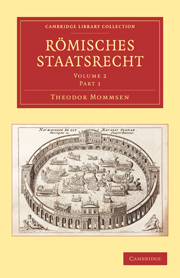Book contents
- Frontmatter
- Contents
- Das Königthum S. 3—15
- Die magistratische Befugniss des Oberpontifex S. 16—69
- Das Consulat S. 70—124
- Die Dictatur S. 125—153
- Das Reiterführeramt S. 156—164
- Der Consulartribunat S. 165—175
- Die Prätur S. 176—216
- Die Provinzialstatthalterschaft S. 217—246
- Der Volkstribunat S. 247—303
- Die Censur S. 304—442
- Die Aedilität S. 443—491
- Die Quästur S. 492—538
- Magistratische Offiziere S. 539—545
- Die magistratische Geschwornenleitung S. 546—555
- Der Vigintisex-, später Vigintivirat S. 556—571
- Ausserordentliche Beamte für die Reservatrechte der Gemeinde S. 572—600
- Ausserordentliche Aushülfsbeamte S. 601—637
- Die Senatsboten (legati) S. 638—661
- Die ausserordentlichen constituirenden Gewalten S. 662—697
Die Censur S. 304—442
Published online by Cambridge University Press: 29 August 2010
- Frontmatter
- Contents
- Das Königthum S. 3—15
- Die magistratische Befugniss des Oberpontifex S. 16—69
- Das Consulat S. 70—124
- Die Dictatur S. 125—153
- Das Reiterführeramt S. 156—164
- Der Consulartribunat S. 165—175
- Die Prätur S. 176—216
- Die Provinzialstatthalterschaft S. 217—246
- Der Volkstribunat S. 247—303
- Die Censur S. 304—442
- Die Aedilität S. 443—491
- Die Quästur S. 492—538
- Magistratische Offiziere S. 539—545
- Die magistratische Geschwornenleitung S. 546—555
- Der Vigintisex-, später Vigintivirat S. 556—571
- Ausserordentliche Beamte für die Reservatrechte der Gemeinde S. 572—600
- Ausserordentliche Aushülfsbeamte S. 601—637
- Die Senatsboten (legati) S. 638—661
- Die ausserordentlichen constituirenden Gewalten S. 662—697
Summary
Der Begriff der staatlichen Ordnung beruht im gesammten Alterthum auf der Gliederung der Gesammtheit in gewisse als dessen integrirende Theile constituirte Körperschaften, so dass der Gemuindebürger dies nur insofern ist, als er einer jener Unterabtheilungen angehört und die Bürgerschaft betrachtet wird als zusammengesetzt nioht aus einer stetig wechselnden Anzahl von Individuen, sondern aus einer festen Anzahl von Gesammt-heiten. In der ursprünglichen Verfassung ruht die Ordnung dieser Theile auf einem für den Staat wie die Theile selbst unabänder-lichen Naturgesetz, in das die Obergewalt des Staats wie die Aulonomie der Theile nur in untergeordneter Weise eingreifen. Dies Naturgesetz ist das Geschlecht, die also geordnete Gemeinde die Geschlechter- oder, romisch ausgedrückt, die Palriciergemeinde. Mit deren Ordnung hat die Gemeinde als solche nichts zu thun; nicht der Staat macht den Einzelnen weder zum Cornelier und Fabier noch zum Geschlechtsgenossen vollen oder minderen Rechts, oder, was nur ein anderer Ausdruck dafür ist, zum Patricier oder Plebejer, und öffentliche Controle in dieser Hinsicht kennt das rbmische Gemeinwesen schlechterdings nicht.
Aber es liegt in der Nothwendigkeit der staatlichen Ent-wickelung, dass die Staatsangehörigkeit auf dem Naturgeselz, von welchem sie im Princip ausgeht, nicht ewig ruhen bleiben kann, dass das Vermogen oder, genauer gesagt, die Steuerföhigkeit auch bei mangelnder Geschlechtsangehörigkeit die Staatsangehörigkeit verleiht oder, romisch ausgedrUckt, dass neben dem Patriciat die Patricier wie Plebejer umfassende Civitat sich entwickelt.
- Type
- Chapter
- Information
- Römisches Staatsrecht , pp. 304 - 442Publisher: Cambridge University PressPrint publication year: 2010



